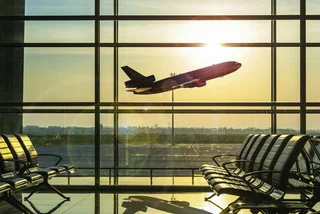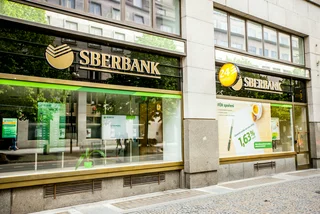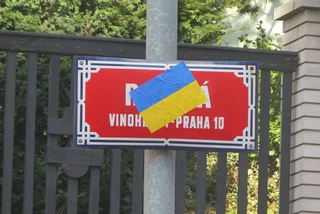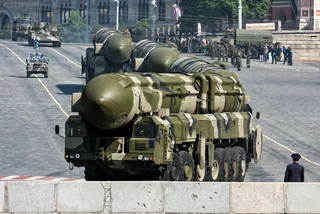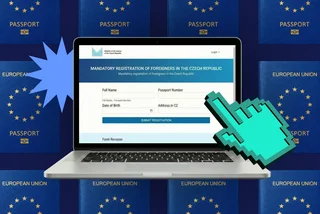Russia’s invasion of Ukraine has sent shockwaves rippling around the world, and the effects of the war can already be felt in the Czech Republic. As the country prepares for an influx of Ukrainian refugees, many are wondering how the almost too-close-for-comfort conflict will impact daily life in Czechia.
Some immediate changes can be glimpsed in Prague and beyond as Russian shops close due to customer boycotts, street signs bearing Russian names are covered with Ukrainian flags, and other small changes take place, such as the cancellation of the usual siren test on the first Wednesday of the month.
Other, more fundamental changes could be on the horizon, especially for the country’s expat community. Here’s a rundown of what you should expect.
The presence of refugees in the Czech Republic
Probably the most noticeable change to daily life will be the incoming Ukrainian refugee population. The Czech authorities have set up a four-tier plan to help arriving refugees; the country is currently at level two, which secures aid and accommodation for up to 5,000 people. Yet with predictions that as many as four million people could flee Ukraine for neighboring countries, this number will only increase.

So-called "entry gates" are being set up in Prague and throughout the country to provide assistance to refugees while expediting administrative processes. Information stands for refugees have been opened in Prague's main railway station and Florenc bus station. Fundraising efforts to help refugees are also underway; details of which can be found here.
While encouraging donations and the voluntarily provision of aid for refugees, the authorities are urging people not to head to the Ukrainian border to pick up refugees. Instead, refugees should come to the country on provided free buses before being processed through official channels.
Long lines, delays in service at foreign police
The Ministry of the Interior has posted on its website that due to the recent emergency situation, the operation of its services is limited only to essential activities requiring personal attendance (i.e. registrations of children born in Czechia, initial applications for residence permits, and changes in the purpose of stay). Other requests should be sent by registered mail.
These restrictions do not apply to Ukrainian refugees applying for a special visa, however, officials are bracing for the influx of refugee registrations: As of Tuesday, March 1, police in Prague were already reporting long lines of refugees at the foreign police on Olšanská Street.
Na cizinecké policii v OlÅ¡anské ulici se tvořà kvůli registraci dlouhé fronty. DÄ›láme maximum, aby lidé Äekali co nejkratÅ¡Ã možnou dobu a ve spolupráci s @CCK_Tweetuje a @PrahaEU pro nÄ› zajiÅ¡Å¥ujeme teplé obÄerstvenÃ. #policiepha pic.twitter.com/PJmZTGnLp1
— Policie ÄŒR (@PolicieCZ) February 28, 2022
Future travel complications
The Czech Ministry of Foreign Affairs has strongly recommended against travel to Ukraine or Belarus, with the EU officially closing airspace to Russian planes, including commercial flights as of Feb. 27, 2022.
When contacted for comment regarding the crisis by Expats.cz, Prague Airport stressed that other than the cancelation of flights to Russia and Ukraine, other operations are proceeding as normal.
Yet with Russia responding in kind to airspace bans, travel providers are scrambling to find alternative routes for some long-haul flights and many passengers are voicing concerns about flying to neighboring countries.
According to Euronews, the European Union Aviation Safety Agency (EASA) says it's still safe to fly to the Baltic states and has so far only warned against traveling over the region of Chisinau in Moldova, and Minsk, the capital of Belarus. Here is a regularly updated list of airlines that have adjusted or will be adjusting their flight path due to the conflict.
State-run train service Czech Railways (ČD) has suspended all train trips to Ukraine. Yet passenger rail travel between Czechia and neighboring countries is not currently affected by the crisis, so those hoping to travel to cities in neighboring countries can at present do so without worrying about cancelations.
Those with train tickets they can no longer use for trips to Ukraine can return them for a full refund without charges but must do so no later than the first day on which the tickets become valid. They must be returned through the same method they were purchased: i.e. tickets bought in person must be returned to cash desks, and requests for refunds for tickets bought online must be made online.
Covid inflation being replaced by war inflation
Economic sanctions against Russian institutions are leading to significant disruption for some living in the Czech Republic. The Czech National Bank today revoked Sberbank CZ's banking license due to its poor liquidity, and issued a preliminary measure stopping the bank accepting deposits or providing loans. Those with Sberbank accounts can find more information about their protection here.
Concerns are also growing about the war's effects on the Czech economy as a whole. The Czech crown has already weakened significantly against the euro, pound, and dollar. Analysts are warning that even steeper declines could be seen over the coming weeks as independent European currencies become a risky asset.
Speaking to Expats.cz about whether investors and business should be alarmed at the prospect of an escalation of the conflict, Václav Nekvapil, Managing Partner at the CEC Group said, “there is no reason why investors should pull out from Eastern Europe. it is very important that we keep our cool in these difficult times, pull together as much as possible, and help those in need.”
Concerns about the strength of the currency will also have a negative impact on inflation, as the Czech Republic suffers from lower international purchasing power. This could drive up prices for everyday products and cause the recent spike in inflation to become even more pronounced, driving down the real value of wages and savings. Airspace closures will meanwhile cause significant complications for global supply chains, with bans affecting airlines carrying around a fifth of the world's air cargo.
The energy sector, which has already seen huge inflation due to supply issues this winter, is likely to suffer even more negative effects, further exacerbated if Russia decides to limit future gas supplies to Europe in retaliation against EU sanctions.
Hostility toward Czechia's Russian population
Czech leaders are calling for tolerance for Russians in the Czech Republic, many of whom do not support Russian President Vladimir Putin's actions. Prague Mayor Zdeněk Hřib has appealed to people in Prague to show goodwill and tolerance toward both Ukrainian and Russian families living in the city. “Russians ≠ Putin. Let’s not apply the principle of collective guilt. Let's be human,” he said on Facebook.

“There are a huge number of democratically and free-minded Russians in Russia, in the world and in the Czech Republic, who do not agree with Vladimir Putin's regime, or even protest and oppose it. Let us not punish them unjustly because of their origin. They are often with us precisely so that they can live in a free country and freedom is their own,” he added.
The Czech Republic's chief public prosecutor, Igor Stříž, recently warned that expressing support for Russia's invasion in public can be considered a criminal offense.
Under Czech law, expressing support for crimes against humanity or genocide is punishable by up to three years in jail. Stříž noted that the legal assessment of such acts is complex; but it's been confirmed that police will monitor public gatherings and cyberspace for malign expressions of support for Russia's actions.
Increased anxiety about safety and security
Russian President Vladimir Putin escalated his threats to the international community Sunday by placing Russia's nuclear capabilities on high alert. He has previously warned that any countries which actively interfere in the Ukraine conflict will feel "consequences that you have never encountered in your history."
Such statements will undoubtedly cause fear and alarm, so should people living in the Czech Republic be worried about a nuclear catastrophe, or about future Russian aggression targeting other countries in Central and Eastern Europe?
Expats.cz spoke to Association of International Affairs Research Fellow and expert on Russian domestic and foreign policy Pavel Havlíček about whether Putin's nuclear threats should be taken seriously.
"People shouldn't be worried about this kind of rhetoric, which was to be expected from Putin," Havlíček said. "It illustrates that the Russian military operation is not developing according to initial expectations and that he needs extra leverage over Ukraine as well as the Western world. His strong statements came just after the West imposed strong economic sanctions against Russia and took proactive measures vis-à-vis Ukraine, but they shouldn't affect Czech citizens and people living in Czechia more generally.
"When it comes to the practical implications for Ukraine, which is not under EU and NATO protection in terms of the nuclear capability to push back against Russia, the situation is a little bit more complicated. But I would still describe the nuclear threat as an instrument of pressure rather than a real move towards launching a nuclear conflict, which would have powerful international implications for Russia, most likely leading to a global conflict.
"Therefore, I would encourage calm among Czech citizens and the expat community in Czechia. Current rhetoric should be put in a wider context, in which there is still a long way to go before nuclear weapons could be included in the conflict."
For anyone who is feeling increased anxiety, Prague Integration has compiled a list of tips for how to manage your fears.












 Reading time: 7 minutes
Reading time: 7 minutes 






